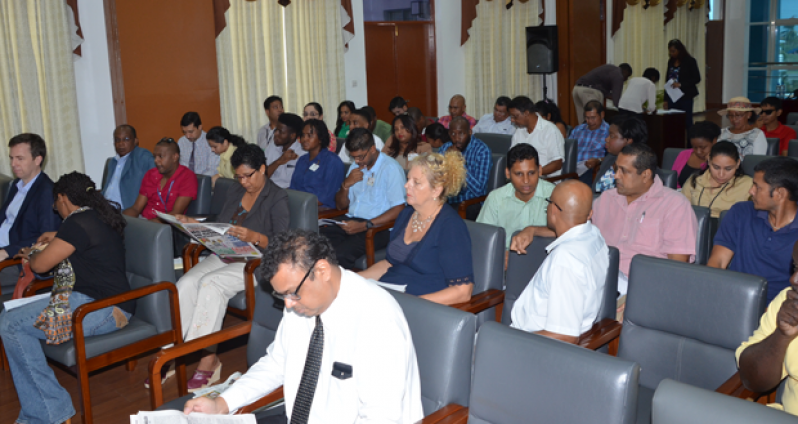By Rabindra Rooplall
DESPITE the security nightmare of Friday’s terrorist attacks in Paris, Guyana will attend the United Nations Climate Summit in early December, Governance Minister Raphael Trotman confirmed Saturday. Trotman made the statement at the Arthur Chung Convention Centre during a public consultation on Guyana’s participation at the Summit.
Attending the consultation was Guyana’s Lead Negotiator Andrew Bishop, Guyana Policy Forum representatives Joycelyn Dow and Mike McCormack, civil society organisations and others.
Trotman said in Paris there are scenes of death, brutality and gore which raised the issue of a quest for world peace in all our actions.
“We remember the victims of war and terror in Paris and other parts of the world; we join with the people of France in condemning terrorism.
“For me we must go to Paris, because if we don’t go we would be handing a victory to those who are trying to prevent the good that needs to be achieved; we must go there and find agreements on behalf of the rest of the world,” Trotman stated.
He said it is the intention of the government to have a “Guyana position” as representatives aim to have Intended Nationally Determined Contributions (INDCs) which will focus on forest and the energy sector.
“We must acknowledge that this issue of environmental protection, climate change, and climate mitigation must not be treated with a cursory glance but must be embraced by all stakeholders,”
He said it is in Guyana’s best interest to stand united and confident in what is there to offer the world and what is being sought for protection for the future generations.
According to the Governance Minister, consultations were held locally with the indigenous peoples and other stakeholders in the climate-change sector. Guyana’s participation at the Belize workshop is part of the country’s preparation for COP 21. He noted that the rapid rate of global climate change continues to consume the attention of world leaders, as continuous brainstorming sessions and conferences are convened, focusing on ways to mitigate its effects. In Guyana, the government is sparing no effort to this cause.
Cabinet had earlier in the year approved the appointment of a taskforce to advance Guyana’s engagement in the United Nations Framework Convention on Climate Change (UNFCCC) process.
“We are therefore gathered to do justice to our individual and collective responsibility to our environment, our nation’s patrimony and world as we consult on Guyana’s position on Climate Change and the INDC.
“We welcome the initiative of civil society in proposing further comments on the document that were submitted which resulted in the forum,” Trotman emphasised.
He said the collaborative nature of what is being forged is important to note as Guyana is at the end of its first phase with its agreement with Norway and is keenly interested in strengthening the relationship which will benefit all Guyanese and the rest of the world.
“Guyana has already signalled to Norway that we are interested in an extension of our agreement, and we have been in touch with the Norwegian Ministry of Climate Change to further discussions, which will take place on December 8, 2015 in Paris,” he said.
“As we transition into a green economy, one that truly represents the country’s image and status as a world leader in environmental protection…”
He said government is pursuing the best energy mix for the country with the abundance of water, sun, wind and other natural resources.
According to Andrew Bishop, who did a presentation of issues and positions for COP21, Norway’s International Climate and Forest Initiative (NICFI) supports the development of the REDD+ international agenda and architecture.
The primary goal is to help establish a global, binding, long-term post-2012 regime that will ensure the necessary and sufficient cuts in global greenhouse gas emissions to limit global temperature rises to no more than 2°C.
He explained that governments from countries around the world are working to design policies that will stop climate change, help people adapt to the changes that have already happened, and better prepare for changes that are likely to happen in the future.
Countries work through international organisations that help governments work together to make policies on many important issues, including climate change. The international organisation that leads international policymaking is the United Nations (UN), which includes 192 countries—almost every country in the world.
Meanwhile, Guyana Policy Forum representative Joycelyn Dow said Guyana is among the world’s richest countries in forest carbon stocks per capita, and Guyana enjoys unique opportunities to benefit from the increasing concern among the global community to reduce greenhouse gas emissions.
She explained that this will not curb the country’s economic development, but rather provide benefits from conserving our forests that in some cases can out-compete extractive alternatives in today’s marketplace.
“Guyana’s existing Community Monitoring Reporting and Verifying (CMRV) gives us a strategic advantage in providing verifiable emissions results for any REDD+ agreement… Under our agreement with Norway, the focus has been on deforestation (and gold- mining has been the primary driver of deforestation), but the UNFCCC’s focus in Paris and beyond is emissions,” Ms Dow explained.












